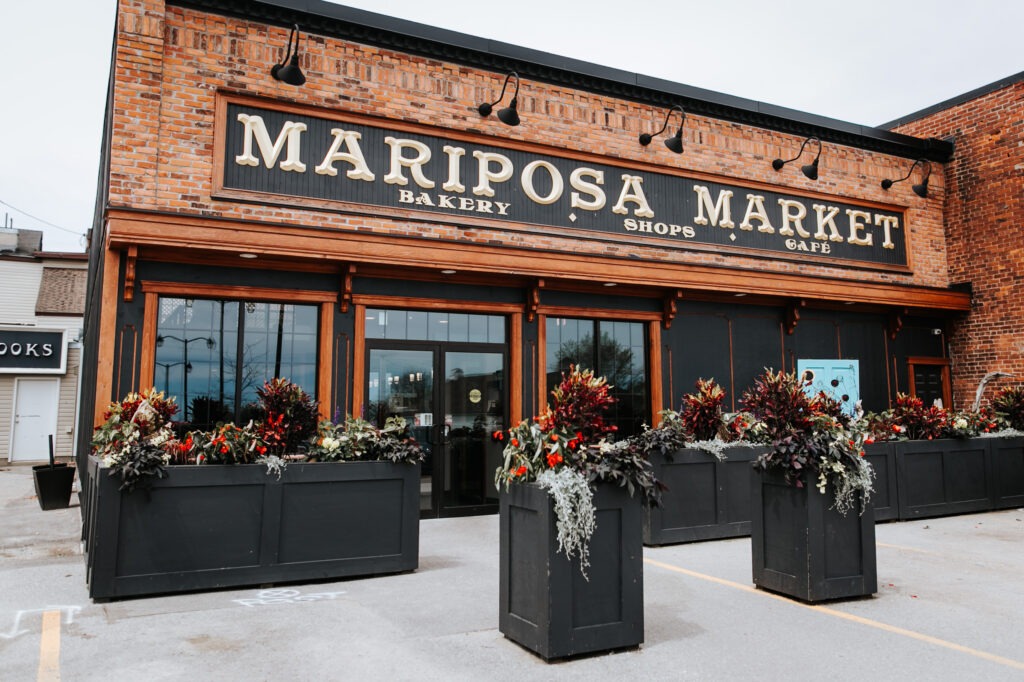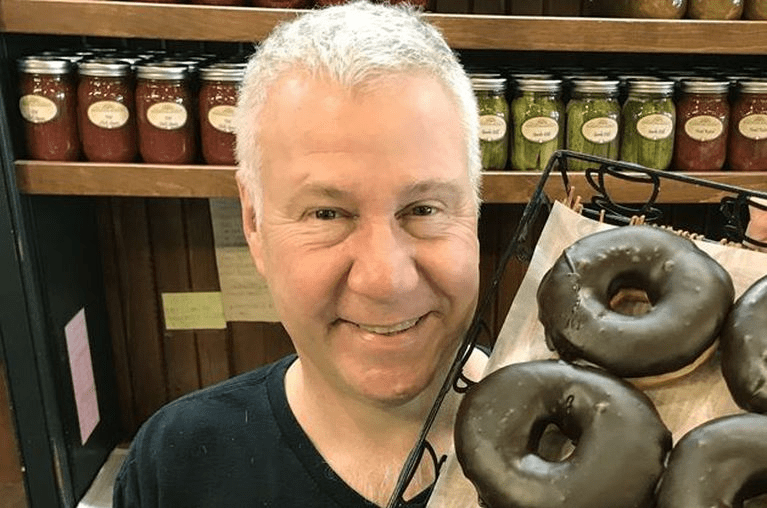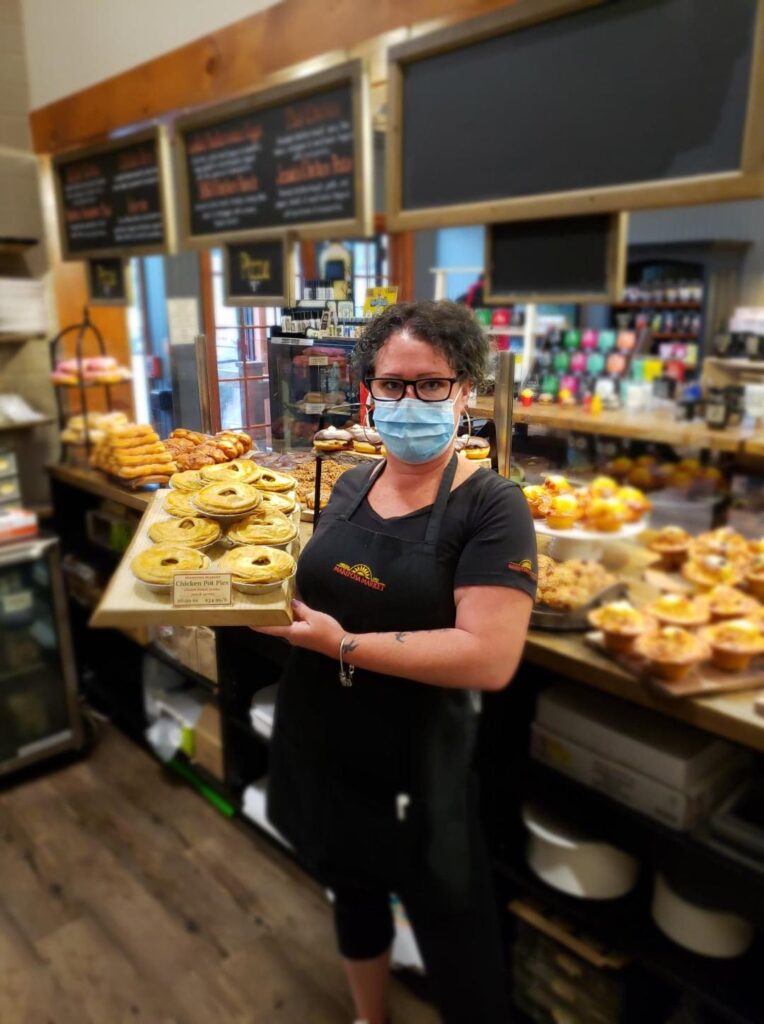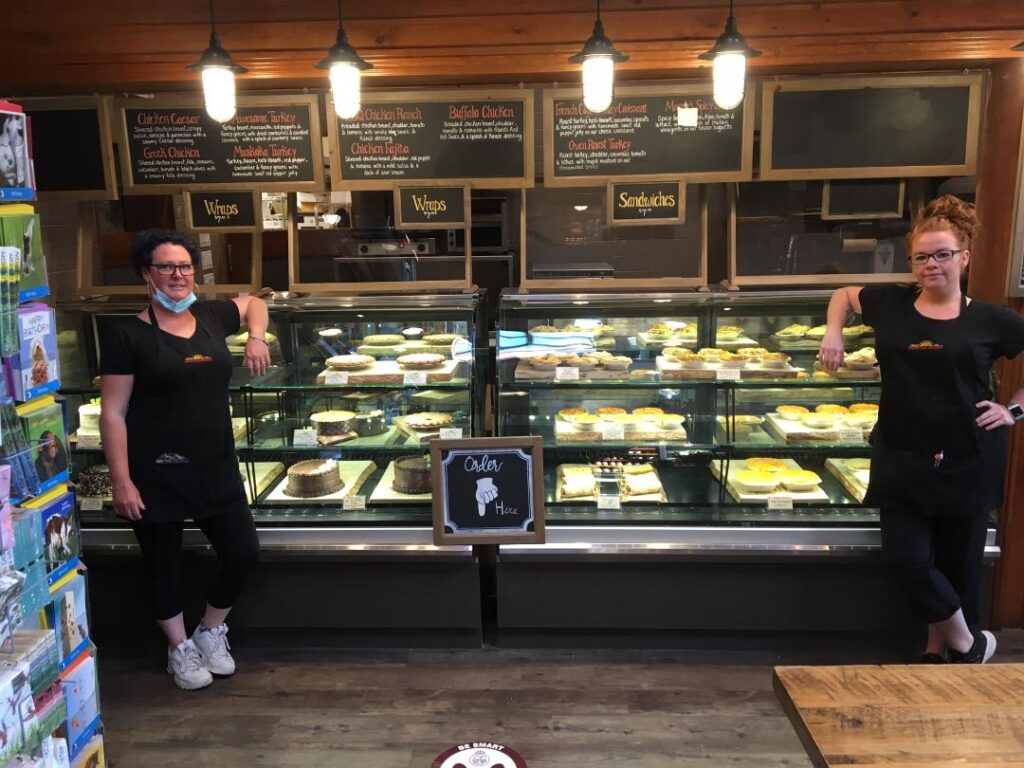Pandemic Profiles #9 – Mariposa Market
Best described as a classic Ontario general store, the Mariposa Market has been a staple in downtown Orillia for over 35 years. Opened in 1987 by Bob Willsey, the family-owned and operated Mariposa Market is housed in a 107-year-old historical building complete with cedar lined balconies, creaky maple floors and a magnificent tin ceiling, which features a bakery, two bustling cafes and two unique gift shops. The food offering is homestyle: savoury meat pies and turkey croissant sandwiches, gooey Chelsea Buns and Muskoka berry pies, and most popular of all, their mammoth chunky apple fritters and signature Texas style donuts. Willsey says he was inspired to open the Mariposa Market after visiting similar old-fashioned general stores around rural Ontario. “I loved the nostalgic feeling of those shops and thought people would get a kick out of having a place like that in Orillia.”

Prior to COVID-19, the Mariposa Market welcomed over 2,000 people a week at the height of the summer season. However, when the pandemic hit, the Mariposa Market was one of the first businesses in Orillia to close up shop, even before a formal lockdown announcement was issued by the government. Willsey temporarily laid off his staff of 80 until further notice. “To protect my staff and customers, I felt we had to take the lead on this as opposed to waiting on a politician to do it.”
Fortunately, the Mariposa Market is uniquely positioned with their food offerings. After the initial month of lockdown, Willsey was able to bring back 15 core employees, pivoting to a fully-online ordering environment. He offered curbside pickup, focusing primarily on baked goods. Eventually he opened a small back section of the store to a very limited flow of customers for pickup only. A few weeks later he was finally able to reopen the main store with modifications. All the seating was removed, the aisles were widened, protective barriers were installed, and the grocery offerings were expanded. Deliveries became a massive part of the business. “Suddenly no one was coming to visit Grandma and Grandpa, so we made a lot of gift baskets for people who were not able to connect with their families,” says Willsey.

In total, Willsey approximates the Mariposa Market was closed for 220 days during the pandemic. He considers himself lucky compared to a lot of other foodservice businesses. “We’re in that fortunate position where our food is casual takeout, not a sit-down white tablecloth environment. We didn’t grind to a halt when the indoor seating stopped because of the bakery. If anything helped us through Covid it was probably our donut sales. People turned to the donut for solace during Covid.”
The Mariposa Market was also able to take advantage of outdoor dining, with two patio areas: the back patio which seats about 20 people, and a front sidewalk patio which was in use prior to the pandemic. “The city has allowed us to use the sidewalk for years, to add to the liveliness of the street – it wasn’t a Covid thing, they have always permitted us to have three or four tables at the front.”

Willsey took advantage of the Canada Emergency Wage Subsidy (CEWS) program, which enabled him to keep his core staff who have been with him for years. “It was a gamechanger. Without that it would have been very tough to survive because we had to basically build the business back up from scratch in April 2020.” Willsey also leveraged a COVID-19 recovery program offered by the Regional Tourism Organization 7 (RTO7), a not-for-profit corporation funded by the Ontario government to support tourism, marketing, and development in the Bruce Grey Simcoe region. He benefited from the one- time, first-come first-served financial assistance fund though which the RTO7 reimbursed 50% of his eligible capital expenditures related to COVID safety and security (e.g., a patio expansion to accommodate more patrons, furniture, heaters, barriers, large scale sanitizing equipment, booking and POS systems, etc.).
Now Willsey is back up to three-quarters of his original staff and operating in a decreased footprint – the seating area has been reduced from 180 to 90. Given the staffing issues the industry is suffering from, he’s happy he was able to retain his core group of employees and bakers. “We are quite fortunate we are back to our key store family.”

The reduction in staff has also encouraged Willsey to reimagine his operations, closing extra counters during slow periods and changing how customers are served. “In pre-Covid days it was full service, with a staff member assisting you on the floor and bringing your order to the cash,” says Willsey. “Now we’re using an expedited system, with two people ringing through orders on cash and two runners. And it works better – we are more efficient this way.” Another change is packaging. Pre-Covid the Mariposa Market used porcelain mugs and plates; now they have moved to a more compostable takeaway model to minimize the spread of germs.
Willsey was also glad he could support the local supply chain model, an integral part of the foodservice industry. When COVID-19 first hit, many of the local suppliers lost massive contracts overnight – all hotel, wedding and conference business just vanished. “Many of our suppliers and wholesalers were thankful for our business because it has helped them to hang in when so much of the foodservice business was totally shut down.”
As the foodservice industry shifts from survival to revival, one of the things Willsey is looking forward to most is the ability to support and participate in local community events, something the Mariposa Market is famous for. “I’m just hoping we can resume some of those fun events that we’ve been doing for so many years within the community. The community has been with us for a long time, and we want to be there for them.”








